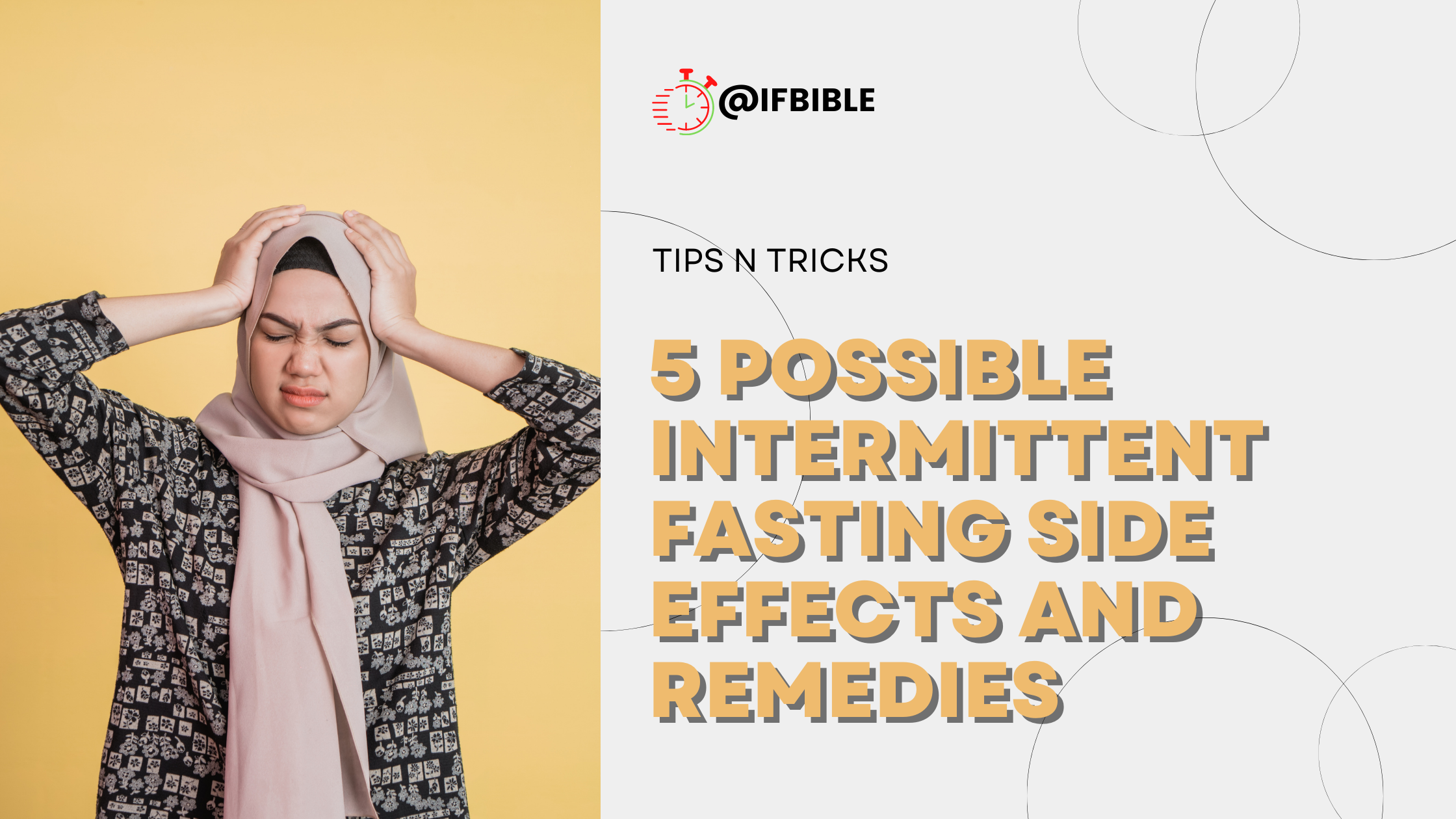5 Possible Intermittent Fasting Side Effects and Remedies
Intermittent
fasting is a term that could be used to describe a style o dieting that include
limiting your eating time to certain hours in a day. During these hours one can
eat just as they normally would but after that they don’t eat until said hours
again. During fasting period, one is not allowed to eat or drink anything that
has calories. Studies have showed that intermittent fasting leads to a number
of health benefits, including:
- weight loss
- lower blood sugar and glucose
- low risks of heart diseases
- lower blood pressure
- improved insulin sensitivity
- improved blood sugar control
If
you’re interested in starting your intermittent fasting journey, am sure you’re
curious to know whether it has side effects.
Well,
for most people Intermittent fasting is safe. However, intermittent fasting
does have some minor side effects.
In This
article you will learn about the 5 possible side effects that could happen when
you fast. P.s. a lot of these aren’t necessarily bad. They are just signs that
your body is adjusting to a new life style.
1. Increased Hunger and cravings
Obviously,
hunger is one of the most common side effects related to intermittent fasting. When
you reduce your calorie intake or go long periods without eating, you will
experience increased hunger.
A
study was conducted and some participants were placed on an intermittent energy
restriction group. It was found that this group reported a higher hunger level
tan those placed on a regular diet. hunger is usually a symptom people
typically experience during the first days of a fasting regimen. So, worry not,
symptoms like hunger may resolve as your body adapts to regular fasting periods
(which is the main aim of fasting).
Remedy
To help reduce your hunger levels add a teaspoon
of lime or Apple cider vinegar to a glass of water and drink it regularly. This
will help reduce your insulin levels and reduce your hunger.
2. Headaches and lightheadedness
Having
Headaches is a common side effect of intermittent fasting. So, don’t worry
yourself too much. They typically happen in the first few days of fasting.
interestingly,
people who often get headaches are prone to headaches during fasting than those
who don’t. these Headaches usually occur as a result of low blood sugar and
caffeine.
Remedy
· To help
with headaches and lightheadedness add some salt (1/4 teaspoon) to a glass of
water and drink it. This will provide your body with electrolytes which will
help reduce the headaches.
3. Gastro-intestinal Tract issues
Gastro-intestinal
Tract (GIT) issues — including constipation, diarrhea, nausea, bloating and
Ulcer— are symptoms you might experience if you do intermittent fasting.
The
reduction in food intake that comes along with some intermittent fasting
regimens – which is usually as a result of the shift in balance of liquids - may
negatively affect your digestion, causing constipation and other side effects.
Dehydration
is also another common side effect related to intermittent fasting and can
worsen constipation.
Remedy
- Eat foods that have High Fiber
- Drink water Regularly
4. Tiredness and low energy
Studies
show that some people practicing various methods of intermittent fasting
experience Tiredness and low energy.
Low blood sugar as a result of intermittent fasting can cause you to feel tired and weak. In some people, intermittent fasting may lead to sleep disturbances which can cause tiredness during the day. This effect usually only happens when you start your intermittent fasting Journey as some studies have shown that intermittent fasting can actually reduce fatigue, especially as your body becomes adapted to regular fasting periods.
Remedy
- Avoid doing strenuous activities during the early stages of your fasting.
- Eat properly and make sure your diet is balanced during your fasting period
- Drink water regularly
5. Bad breath
Bad
breath is a possible side effect that can happen to some people during
intermittent fasting. This happens as a result of lack of salivary flow and the
rise of acetone in the breath.
Fasting
causes your body to convert fat to fuel. Acetone is one of the by-products of
fat metabolism, so it increases in your blood and breath during fasting
Furthermore,
dehydration — a symptom associated with intermittent fasting — can cause dry
mouth, which may lead to bad breath.
Remedy
- Add apple cider vinegar to water when drinking
- Drink water regularly.
People Who should avoid intermittent fasting
90 %
of the time intermittent fasting is okay for people but Some people may be at
risk of dangerous side effects if they participate in intermittent fasting.
Healthcare
professionals generally advise that the following people avoid intermittent
fasting:
- Pregnant or breastfeeding mothers
- Children and teens
- Elders/seniors who experience weakness
- people with HIV/AIDS
- people with eating disorders currently or in the past
- People who are on Medication e.g Painkillers
· The list goes on. Just make sure you consult your physician if you have doubts.
Additionally,
if these side effects are still prominent after the first few days of
intermittent fasting, this may be a sign that it isn’t working for your body. Also
Don’t continue with your intermittent fasting program makes you feel miserable.
You can either stop completely or reduce your fasting Hours.
Conclusion
In
conclusion, even though intermittent fasting has been tied to health benefits,
there are many other things you can do to benefit your health that don’t
involve fasting – if fasting is not for you. Make sure you Follow a balanced
and nutritious diet, get proper sleep, engage in regular physical activity, and
manage stress — these are much more important for promoting overall health.


